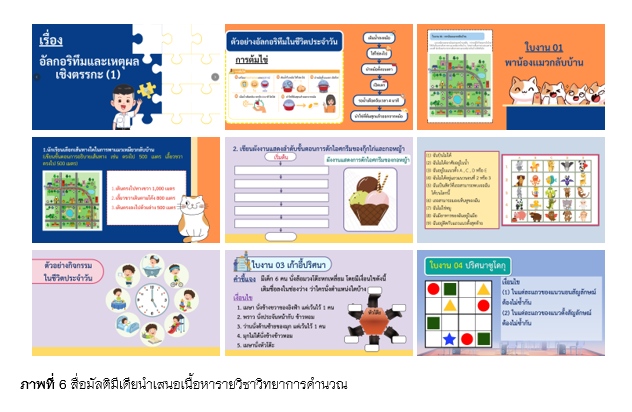การพัฒนานวัตกรรมการเรียนรู้บนโลกเมตาเวิร์สรายวิชาวิทยาการคำนวณ ระดับชั้นประถมศึกษาตอนปลาย
Main Article Content
บทคัดย่อ
งานวิจัยนี้มีวัตถุประสงค์เพื่อ 1) พัฒนานวัตกรรมการเรียนรู้บนโลกเมตาเวิร์สรายวิชาวิทยาการคำนวณระดับชั้นประถมศึกษาตอนปลาย 2) ประเมินคุณภาพนวัตกรรรม 3) เปรียบเทียบผลสัมฤทธิ์ทางการเรียนของผู้เรียนก่อนและหลังเรียนด้วยนวัตกรรม และ 4) ประเมินความพึงพอใจในการใช้งานนวัตกรรม กลุ่มตัวอย่างในการวิจัย คือ 1) ครูที่สอนรายวิชาวิทยาการคำนวณระดับชั้นประถมศึกษาตอนปลาย จำนวน 2 คน สำหรับตรวจสอบเนื้อหา 2) อาจารย์จากมหาวิทยาลัยสำหรับประเมินคุณภาพนวัตกรรม จำนวน 3 คน และ 3) นักเรียนชั้นประถมศึกษาปีที่ 6 โรงเรียนสาธิตมหาวิทยาลัยราชภัฏเชียงใหม่ จำนวน 47 คน สำหรับใช้งานนวัตกรรม ได้มาแบบเจาะจง เครื่องมือที่ใช้ในการวิจัย คือ 1) นวัตกรรมการเรียนรู้ 2) แบบประเมินคุณภาพนวัตกรรม 3) แบบทดสอบวัดผลสัมฤทธิ์ และ 4) แบบประเมินความพึงพอใจ สถิติที่ใช้ในการวิเคราะห์ข้อมูล คือ ค่าเฉลี่ย ส่วนเบี่ยงเบนมาตรฐาน และการทดสอบค่า t-test ผลการวิจัย คือ นวัตกรรมการเรียนรู้บนโลกเมตาเวิร์สนำเสนอเนื้อหารายวิชาวิทยาการคำนวณ ระดับชั้นประถมศึกษาตอนปลาย ประกอบไปด้วย สื่อมัลติมีเดีย การ์ตูนแอนิเมชัน นำเสนอเนื้อหารายวิชาวิทยาการคำนวณระดับชั้นประถมศึกษาตอนปลาย แบบฝึกหัดระหว่างเรียนพร้อมเฉลย เกมฝึกทักษะ AR โดยสื่อการเรียนรู้ทั้งหมดนำเสนอในเมตาเวิร์สรายวิชาวิทยาการคำนวณ ผลการประเมินคุณภาพนวัตกรรมจากผู้เชี่ยวชาญ อยู่ในระดับมากที่สุด ด้วยค่าเฉลี่ย 4.75 (S.D. = 0.30) ผลการเปรียบเทียบผลสัมฤทธิ์ทางการเรียนของผู้เรียนก่อนและหลังเรียนด้วยนวัตกรรมมีค่าเฉลี่ยหลังเรียนสูงกว่าก่อนเรียนอย่างมีนัยสำคัญทางสถิติที่ระดับ 0.05 และ ความพึงใจในการใช้งานนวัตกรรมอยู่ในระดับพึงพอใจมาก ด้วยค่าเฉลี่ย 4.02 (S.D. = 0.92)
Downloads
Article Details

อนุญาตภายใต้เงื่อนไข Creative Commons Attribution-NonCommercial-NoDerivatives 4.0 International License.
เอกสารอ้างอิง
Boonlue, S. (2022). Metaverse for education: The connection between the metaverse with the real world of learning to create immersive learning. Academic Journal of North Bangkok University, 11(1), 9-16. [in Thai]
Brahmawong, C. (2013). Developmental testing of media and instructional package. Silpakorn Educational Research Journal, 5(1), 7-20. [in Thai]
Butdangnoi, N. and Suramane, S. (2017). The development of the game for learning on the communications medium data for Mathayomsuksa 2. Journal of Project in Computer Science and Information Technology, 3(1), 29-35. [in Thai]
Chaijaroen, S., Kanjug, I., Samat, C., and Kwangmuang, P. (2018). Design and development the learner’s knowledge construction learning innovation based on Thai wisdom and Thai living on the topic of soil for fourth grade students. Journal of Humanities and Social Sciences Mahasarakham University, 9(1), 134-157. [in Thai]
Cheunchomputh, M., Mahavijit, P., and Sangchan, W. (2020). Development of mathematical activities based on gamification to enhance communication skills and learning motivation for Mathayom 3 students. CMU Journal of Education, 4(2), 98 – 110. [in Thai]
Hadkhuntod, P. and Sangkudluo, T. (2022). Creation of multimedia learning materials elementary computational science course for small schools with a shortage of teachers. Journal of Community Development and Life Quality, 10(3), 302-313. [in Thai]
Leethong-in, P., Thitipetchakul, C., Ploysopon, A., and Sananram, L. (2023). The Development of Instructional Model for Life Skills with Massive Open online Courses (MOOCs). Journal of Graduate Research, 14(1), 31-50. [in Thai]
Lerdbumrungchai, K. (2022). Spatial metaverse. Retrieved from https://touchpoint.in.th/spatial-metaverse/ [in Thai]
Muangchan, N., Supapaan, T., Poonphol, P., Srilapat, A., and Rodpai, T. (2021). Development and evaluation of the achievement of 2D cartoon animation media to enhance knowledge about hand, foot and mouth disease for pre-school children, Ubon Ratchathani Province. Journal of Health Science, 30(3), 481-490. [in Thai]
Office of the Royal Society. (2015). Virtual reality. Retrieved from https://coined-word.orst.go.th/ [in Thai]
Panyoyai, N. and Maneekosol, C. (2020). A study of learning achievement and a desirable characteristic of sufficient living using income-expense record for primary 6 students, Demonstration School of Chiang Mai Rajabhat University. Journal of Graduate Research, 11(2), 137-148. [in Thai]
Prasertsith, K. (2021). A development of animation media with local wisdom in field of mathematics: Case study of Wat Metarang School, Sam Khok District, Pathum Thani Province. Journal of Community Development and Life Quality, 9(1), 134-145. [in Thai]
Saleephol, C. (2022). Metaverse: Into the eduverse. Retrieved from https://missiontothemoon.co/metaverse-education/ [in Thai]
Satuwicharn, A., Wangkaewhiran, T., and Onkasem, P. (2020). The effects of using packages “Read to know, look thoroughly, write fluently” on Thai reading and writing abilities of Prathomsuksa 1 Students. Journal of Graduate Research, 11(2), 95-108. [in Thai]
Sooksamrarn, S. and Superkitjumnong, K. (2022). The development of learning achievement in computing science on data management for Matthayomsuksa 5 though data management technology e-book series. Journal of Roi Kaensarn Academi, 7(3), 152-163. [in Thai]
Srikhamvieng, W. (2018). Computing science. Retrieved from https://www.scimath.org/lesson-technology/item/8808-computing-science [in Thai]
Srisa - ard, B. (2017). Preliminary research. (10th ed.). Bangkok: Suwiriyasan. [in Thai]
Srisompun, O. (2015). Population and sampling: Quantitative research. Retrieved from https://www.ubu.ac.th/web/files_up/08f2015112820164117.pdf [in Thai]
Suwannasri, P., Chotikadachanarong, K., Patcharatanaroach, S., Kankhat, S., and Bungcoment, M. (2020). Multimedia development presents tissue culture techniques in Hippeastrum. Phranakhon Rajabhat Research Journal, 15(1), 68-80. [in Thai]
The Kommon. (2022). Virtual worlds and metaverses futuristic education or technological fashion?. Retrieved from https://www.thekommon.co/rutchanee-gullayanon-metaverse [in Thai]
Wattana, T., Kusolsong, S., and Treewong, P. (2022). Developiment of learning activities model with the basic addition edition educational games to promote math skills for early childhood. Udon Thani Rajabhat University Journal of Guru Education, 4(1), 33-51. [in Thai]
Wongrattana, C. (2017). Techniques for creating research instrument: Professional use guidelines. Bangkok: Amorn Printing Press. [in Thai]
Yasaka, S. and Suksakulchai, S. (2020). Study of status, problems, and needs of computing science learning Management. In The 12th NPRU National Academic Conference, (pp. 2191-2199). 9-10 July, 2020. Nakhon Pathom: Nakhon Pathom Rajabhat University. [in Thai]


